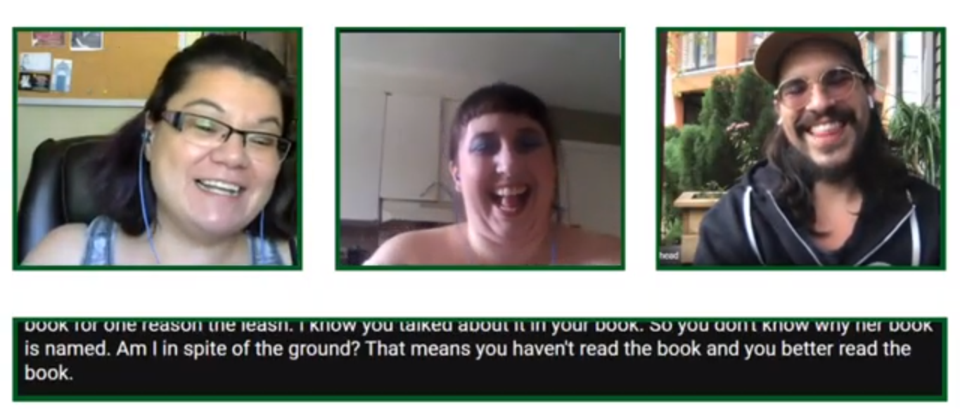The conversation between authors Joshua Whitehead and Alicia Elliott and moderator Lori Deets at the Friday Lunch Is Lit session was an incredible look at the perspectives of Indigenous authors working in the Canadian literature scene.
During the live reading portion of the event, two-spirit and Oji-Cree author Joshua Whitehead shared an excerpt from his award-winning novel Jonny Appleseed, while Mowhawk writer Alicia Elliott read a series of selections from her essay “Sontag, in Snapshots” which is included in her non-fiction book A Mind Spread Out on the Ground.
The following discussion broached the topic of how each author approached naming their work, which Whitehead shared came from the idea of repurposing the Christian children’s song “The Lord is Good to Me” and the line about Johnny Appleseed that he remembers having to sing at camp in his childhood.
“When I was thinking about this character Johnny, who’s going to be like maybe the antithesis of those kinds of embellishments like innocence or childhood, … I really wanted to play with that,” said Whitehead. “In my head, I was like I’m going to just make the most unabashedly sexy glitter princess I can imagine, who doesn’t really abide by rules of innocence and really celebrates their body even though they’re told not to so many times in the book.”
The pair of authors also addressed how they chose the structure of their work, with Elliott explaining that her collection of personal essays is largely her way of examining herself in the larger context of society, and her own self-reflection.
“By the time [the readers] reach the end, they’ve seen me go through and acknowledge all these ways I’ve been wrong and the ways that I’ve been embarrassed or ashamed, and say that it’s okay,” said Elliott. “If you can still, as the reader, accept that I can grow as a person despite all the stuff that I’ve experienced, then of course you can grow as a person too.”
For Whitehead, the roman numerals that separate sections of Jonny Appleseed were very intentional and were meant to show how storytelling, especially Indigenous storytelling, often subverts the idea of time as linear.
“I think in a way it's more like a photo album [than a novel], or just the way that Indigenous people talk, like ‘let’s sit down, I have a story to tell you but first I have to tell you this story and this story and this story,'” said Whitehead. “That was exactly what I wanted [the narrative] to be because this is how I talk, how I think, and how my community has conversations, so this was the best way for me to write and, at that point, the most applicable way for me to decolonize the form of the novel.”
The session concluded with both authors talking at large about the experience of being Indigenous writers in the Canadian literary scene and how important it is to respect the history of the Indigenous voices who came before them.
Whitehead spoke about recognizing Indigenous women and two-spirit authors who often exist on the peripheries of the spotlight.
“For me, the acknowledgement section [of Jonny] was a way for me to pay homage and respect for those who have paved the way for me, and also for those I’m mentoring and helping right now to take the mantle, the fire we’re holding,” said Whitehead.
Elliott agreed, sharing her own thoughts about the past struggle of Indigenous authors often being limited in what they could write, sharing the example of how a section of Maria Campbell’s autobiography Halfbreed was removed, and how things are different for present Indigenous voices.
“You have publishers being put in this position where they are editing Indigenous lives to make them more palatable for white audiences,” said Elliott. “And so it's so important to situate those things when we talk about Indigenous writers who came before us, who were the first [because current Indigenous writers] are doing so much amazing work and they’re only able to do that because these people did that gruelling work that no one wants to do."
“I’m really glad that we have more opportunities to do that, and I think there’s more willingness from publishers to critically think outside of what they imagine Indigenous literature to be, and actually ask us what we envision Indigenous literature to be,” she continued. “I think that’s the role publishers should be playing [and] I do think it’s changing because audiences don’t want the stuff we’ve been told they want.”
The Festival of Words continues until July 19, with a full schedule of events available here.
Stay tuned for coverage of the festival as it progresses through the week.




